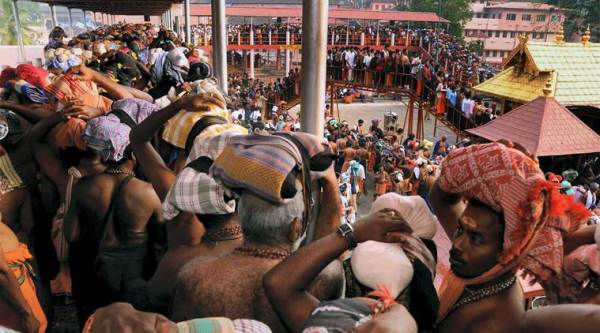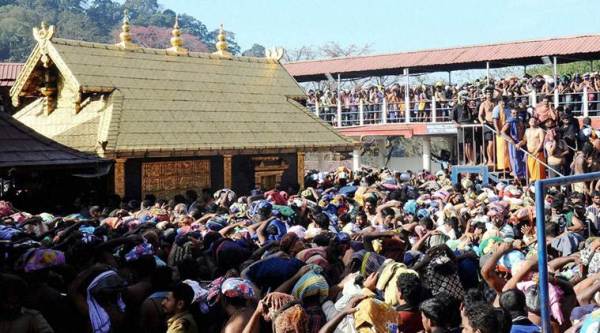 Sabarimala verdict in Supreme Court today: A five-judge bench Friday was examining the legality of prohibiting women between the ages of 10 and 50 from entering the temple due to “impurity”. (File Photo)
Sabarimala verdict in Supreme Court today: A five-judge bench Friday was examining the legality of prohibiting women between the ages of 10 and 50 from entering the temple due to “impurity”. (File Photo)
Putting an end to a centuries-old tradition, the Supreme Court Friday ruled that women, irrespective of age, can enter Kerala’s Sabarimala temple. A five-judge Constitution bench, headed by Chief Justice of India Dipak Misra, said that the provision in the Kerala Hindu Places of Public Worship (Authorisation of Entry) Rules, 1965, which authorised the restriction, violated the right of Hindu women to practice religion. It also said that patriarchy in religion cannot be allowed to trump the right to pray.
The bench, which also comprised Justices R F Nariman, A M Khanwilkar, D Y Chandrachud and Indu Malhotra, had reserved its verdict in the case on August 2 this year. Four judgments were delivered today. Justice Malhotra, who penned a dissenting verdict, said the petition does not deserve to be entertained.
A clutch of petitions had challenged the ban, which was upheld by the Kerala High Court. The HC had ruled that only the “tantri (priest)” was empowered to decide on traditions. The petitioners, including Indian Young Lawyers Association and Happy to Bleed, argued in court that the tradition is discriminatory in nature and stigmatised women, and that women should be allowed to pray at the place of their choice.
 Sabarimala verdict Supreme Court today highlights: Ayyappa devotees throng Sannidanam in Sabarimala. (PTI Photo/File)
Sabarimala verdict Supreme Court today highlights: Ayyappa devotees throng Sannidanam in Sabarimala. (PTI Photo/File)
Four judges on the bench ruled in favour of lifting the ban on women entering Sabarimala temple. CJI Dipak Misra and Justices Khanwilkar, Nariman and Chandrachud found the practice discriminatory in nature and that it violates Hindu women's right to pray. Here are top quotes from the majority judgment:
Justice Indu Malhotra, who wrote the dissenting judgment in the Sabarimala case, said that the notions of rationality cannot be brought into matters of religion. She added that the shrine and deity are protected under Article 25 of the Constitution and that it was not upto the court to decide which religious practices should be struck down, except in issues of social evil like 'Sati'. Justice Malhotra, the only woman on the bench, was of the view that the petition does not deserve to be entertained. Read more here.
In case you're just joining us, the Supreme Court in a 4:1 verdict has ruled in favour of women of all ages entering the Sabarimala temple. CJI Dipak Misra and Justices Khanwilkar, Nariman and Chandrachud were in favour while Justice Malhotra dissented. In her dissent opinion, Justice Malhotra said that the petition does not deserve to be entertained. She added that the verdict will have far-reaching implications for other places of worships.
Justice Indu Malhotra, who has penned a dissenting judgment, says worshippers of Sabarimala temple constitute a separate religious denomination. Justice Malhotra is the only woman on the five-judge bench. She adds that the petition does not deserve to be entertained.
"Notions of rationality cannot be invoked in matters of religion," Justice Indu Malhotra said. "What constitutes essential religious practice is for the religious community to decide, not for the court. India is a diverse country. Constitutional morality would allow all to practise their beliefs. The court should not interfere unless if there is any aggrieved person from that section or religion."
Reacting to the verdict, the Travancore Devaswom Board president has said he will file a review petition. The TDB manages the Sabarimala temple. "We will go for a review petition after getting support from other religious heads," A Padmakumar is quoted as saying by news agency ANI.
Justice Indu Malhotra who has penned a dissenting verdict is currently reading her observation. Adding that the issue is critical to various religions, she said, "Issues of deep religious sentiments should not be ordinarily be interfered by the Court. The Sabarimala shrine and the deity is protected by Article 25 of Constitution of India and the religious practices cannot be solely tested on the basis of Article 14."
Justice Chandrachud also said that not allowing the woman to enter because they are of procreating age is "derogatory" to them. "To exclude women of the age group 10-50 from the temple is to deny dignity to women. To suggest that women cannot undertake the 41-day vratham is to stereotype them," he said.
Justice Chandrachud has begun reading his judgement. "Religion cannot be cover to deny women right to worship. To treat women as children of lesser God is to blink at Constitutional morality," he said in the obseravtion
Meanwhile, in Kerala, Sabarimala Tantri Kantararu Rajeevaru expressed disappointment at the verdict but said his family will abide by the apex court's ruling. The Pandalam royal family, which is custodian of the temple and associated with rituals, too called the verdict disappointing.
Justice Rohinton Nariman concurs with CJI Dipak Misra. "The custom of barring women is violative of Article 25(1). Rule 3(b) of Kerala Hindu Places of Public Worship (Authorisation of Entry) Rules,1965 struck down by Justice Nariman. Fundamental Rights under PART III of Constitution is essential for transformation of a society"
The Kerala Hindu Places of Public Worship (Authorisation of Entry) Rules, 1965, violate the right of Hindu women to practice religion, says CJI. The practice of age restrictions on women entry to Sabarimala temple cannot be treated as essential practice, he adds. CJI has written the judgment on behalf of himself and Justice Khanwilkar.
The CJI says Ayyappa devotees do no constitute a separate religious denomination. The TDB had argued in court that they should be allowed to make the rules as they form a denomination.
The CJI says patriarchal rules have to change, and that patriarchy in religion cannot be allowed to trump right to pray and practise religion. He adds that any rule based on biological characteristics cannot pass muster of constitutional test.
Chief Justice of India Dipak Misra is delivering a verdict on behalf of himself and Justice Khanwilkar. Justices Nariman and Chandrachud are expected to concur with him. The CJI said Justice Indu Malhotra has written separate dissenting verdict.
The bench has assembled to pronounce the verdict in the case. Four judgments will be delivered today. Four judges have concurred, while Justice Malhotra will pronounce the dissenting verdict.
Four judgments will be delivered by the Supreme Court this morning. CJI Dipak Misra, Justice Nariman, Justice Chandrachud and Justice Malhotra will deliver separate verdicts. Justice Khanwilkar will concur with one of them. They will assemble at 10.30 am. The judgment is listed as third.
The Constitutional Bench heard arguments for and against entry of women into Sabarimala over eight days this year. During the hearing, the bench had made several observations which serve as a fillip to today's verdict. The court had observed that “what applies to a man applies to a woman” as well and that “once you open it for public, anyone can go”. The bench also said that a “woman’s right to pray was not dependent on any law but it is a Constitutional right”.
“Your (intervener) right to pray being a woman, is equal to that of a man and it is not dependent on a law to enable you to do that,” observed Justice D Y Chandrachud. Justice Nariman had observed that “menstruation is not impure.”
With CJI Dipak Misra retiring on October 2, the Sabarimala case is one of the important issues he has ruled on in the last month. Today, the CJI's court will also rule on the arrest of five activists at 10.30 am and examine whether they should be released from house arrest or whether the probe against them should be handed over to a Special Investigation Team. Follow LIVE UPDATES on the Supreme Court's verdict today.
The Kerala government, during the hearing in the Sabarimala case this year, told the Supreme Court that is favoured entry of women of all ages. However, this has not always been its position in the case. The Left Democratic Front-led government had favoured this position in 2007, but it was over-turned by the Congress-led United Democratic Front.
The Sabarimala controversy can be traced back to the myths that surround Ayyappan and his journey from being a warrior prince to a spiritual recluse. The social landscape that shaped the pilgrimage in the 1950s and thereafter has changed. Not surprisingly, questions are being raised about a tradition that discriminates on the basis of gender. Read more here.
The verdict will be delivered around 10.30 am. A five-judge Constitution bench is hearing the case. It is led by Chief Justice of India Dipak Misra and comprises Justices R F Nariman, A M Khanwilkar, D Y Chandrachud and Indu Malhotra. Four judgments will be delivered today. Justice Khanwilkar will concur with one of the other judges. The verdict is likely to have an impact on temples across Kerala, and their traditions.
There are several petitions lined up in the Supreme Court challenging the management's decision to bar women between the ages of 10 and 50 from entering the temple. The tradition, which the court was told, was born from the belief that the deity is a ‘naishtika brahmachari’ (eternal celibate). This is why pilgrims observe celibacy for 41 days before going to Sabarimala. Further, the board has argued that as women cannot observe celibacy for 41 days, they should be disallowed from entering.
The petitioners have argued that this rule is discriminatory in nature and have demanded that women should be treated equally with men. They have also challenged the belief that women are impure while menstruating, and that this "stigmatises" women.
The Supreme Court Friday will pronounce its judgment in the Sabarimala case. Ahead of the verdict, here's a little about the temple. Sabarimala, dedicated to Lord Ayyappa, is a temple in Kerala. The temple is open to people of all religions and castes but disallows women of menstruating age, those between the ages of 10 and 50, from entering. According to tradition, pilgrims have to observe celibacy for 41 days before going to Sabarimala. The temple is managed by the Travancore Devaswom Board, an affiliate of the Kerala government.